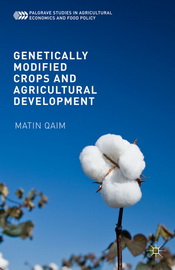November 18, 2015
 Kaum ein anderes Thema im Bereich der Landwirtschaft erhitzt die Gemüter so sehr wie die Gentechnik. Während einige die Technologie als Lösung für das Hungerproblem sehen, befürchten andere neue Risiken und eine Monopolisierung des Agrarsektors durch multinationale Konzerne. Der Göttinger Agrarökonom Matin Qaim forscht seit 20 Jahren zu diesem Thema. Über seine Erfahrungen hat er nun ein Buch geschrieben.
Kaum ein anderes Thema im Bereich der Landwirtschaft erhitzt die Gemüter so sehr wie die Gentechnik. Während einige die Technologie als Lösung für das Hungerproblem sehen, befürchten andere neue Risiken und eine Monopolisierung des Agrarsektors durch multinationale Konzerne. Der Göttinger Agrarökonom Matin Qaim forscht seit 20 Jahren zu diesem Thema. Über seine Erfahrungen hat er nun ein Buch geschrieben.
In dem englischsprachigen Buch „Genetically Modified Crops and Agricultural Development“ berichtet Professor Qaim über Potentiale und Risiken sowie über die tatsächlichen Effekte in verschiedenen Teilen der Welt. Dabei klärt er weit verbreitete Missverständnisse auf. Beispielsweise profitieren Kleinbauern in den Entwicklungsländern bisher am stärksten vom Anbau gentechnisch veränderter Pflanzen.
Ebenso analysiert Qaim Fragen der Technologieregulierung und der Macht unterschiedlicher Interessengruppen aus politökonomischer Perspektive. Sein Fazit: Die öffentliche Wahrnehmung von Chancen und Risiken entspricht nicht dem Stand der Wissenschaft. Vor dem Hintergrund der zunehmenden Ressourcenknappheit kann und muss die Gentechnik einen erheblichen Beitrag zur nachhaltigen Entwicklung leisten, allerdings erfordert dies bessere Politik und einen veränderten gesellschaftlichen Diskurs. Das Buch ist kürzlich im Palgrave Macmillan Verlag erschienen.
http://www.palgrave.com/page/detail/?K=9781137405715
New book about 20 years of experience with GM crops
Source: Crop Biotech Update
In spite of the rapid adoption of GM crops, their use remains contentious. Public opposition and overregulation have become real threats to further developments in modern plant sciences. It is widely believed that GM crops are bad for human health, damage the environment, and hurt smallholder farmers in developing countries, but research shows that the opposite is true. Matin Qaim, a professor of agricultural economics in Germany, has studied the impacts around the world. He has now written a book about his 20 years of experience. The book "Genetically Modified Crops and Agricultural Development" was recently published by Palgrave Macmillan.
In the book, Qaim reviews the impacts of current and possible future GM crop applications and shows that these technologies can contribute substantially to sustainable agricultural development and food security. Popular narratives about "Frankenfoods," "Genetic Contamination," and "Terminator Genes" are deconstructed. Qaim uses a political-economy perspective to explain the emergence and success of the protest industry. He concludes that continued opposition to technologies that were shown to be beneficial and safe entails unnecessary human suffering and environmental degradation. But he remains optimistic and shows what needs to be done in order to advance GMOs responsibly in the future.
In his foreword to the book, Professor Chris Barrett (Cornell University) writes: "I can think of no better scholar to introduce this hot-button topic than Matin Qaim." Professor Calestous Juma (Harvard University) says: "This path-breaking book combines intellectual courage and analytical rigor. It brings balanced research and sobriety to one of the most controversial technological developments of the early twenty-first century."
Read more at Palgrave Macmillan.